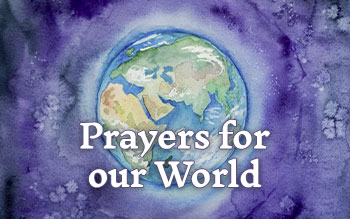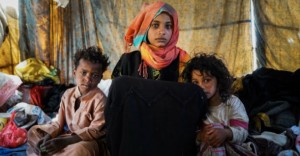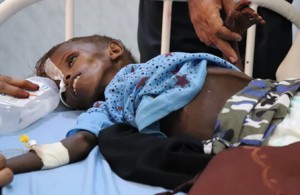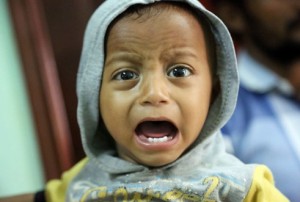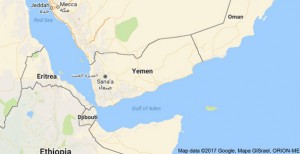Displaying items by tag: Yemen
Famine Crisis in Yemen
The UN says Yemen is facing the world's worst famine in 100 years if the war continues
“Half the population of war-torn Yemen - 14 million people - are facing "pre-famine conditions", the UN has warned…
Medics say the number of deaths linked to food-related factors is rising.
Yemen has been devastated by a conflict that escalated in 2015, when a Saudi-led coalition intervened after the rebel Houthi movement seized control of much of the west of the country and forced President Abdrabbuh Mansour Hadi to flee abroad.
At least 6,660 civilians have been killed and 10,560 injured in the war, according to the UN. The fighting and a partial blockade by the coalition have also left 22 million people in need of humanitarian aid, created the world's largest food security emergency, and led to a cholera outbreak that has affected 1.1 million people…
Every day, 130 children under 5 were dying from extreme hunger & disease in #Yemen at the end of last year. Nearly 50,000 children during the course of a year.
https://t.co/elnwNGQJE6
https://www.bbc.com/news/world-middle-east-45964795
Let’s pray for an end to the hostilities and the economic crisis in Yemen, for the return of peace to this long-suffering nation, and especially for the provision of food and other essential resources needed so desperately right now.
Yemen: 13 million at risk of death
The UN has warned of a historic famine that could put as many as 13 million people in Yemen at risk of death by starvation. The fierce fighting between Saudi-backed government forces and Houthi rebels, and the ongoing blockade of aid shipments, have created the conditions for humanitarian disaster on a scale not seen since Ethiopia in the 1980s or the Soviet Union in the 1930s. 75% of the population need food assistance; 8 to 10 million go hungry daily. Prices have doubled in the past month. The war has killed 10,000 to 50,000 civilians and displaced over two million. Civilian deaths are up 164% since the beginning of the siege of the port city of Hodeidah in June. When 17 were killed on 14 October by Saudi planes bombing buses waiting at a Houthi checkpoint, it was just another daily occurrence. People say, ‘Why is Saudi Arabia under attack over Jamal Khashoggi (a missing, presumed murdered reporter), but not over Yemen?’ See
Saudi Arabia unstable
Saudi Arabia’s stability is becoming fragile as the judgment and competence of Mohammed bin Salman, the young crown prince, are questioned. The kingdom has been stable since 1964, and there was a smooth transition when Salman became king in 2015. However, Prince Muqrin, next in the line of succession, was recently removed with no explanation, in favour of Mohammed bin Salman. He has a track record of impulsive and reckless decisions at home and abroad, which call into question the kingdom’s future. The changes have alienated significant parts of the family. The crown prince’s signature initiative is the war in Yemen, now in its fourth year with no end in sight. The Royal Saudi Air Force has wrecked Yemen’s feeble infrastructure and attacked civilians. One observer said Yemen is now in a death channel. See The kingdom is unpredictable, and the Trump administration financially supports the Yemen war with a blank cheque.
Yemen: mass funeral for boys
On 12 August, a Saudi-led airstrike on Yemen killed 51 people (including 40 children) and wounded 79. The next day hundreds of mourners gathered for a mass funeral for the schoolboys. By the caskets stood signs saying, ‘America killed the children of Yemen’. The procession, organised by Houthi rebels, was one of several taking place across Yemen. The US defence secretary is sending a three-star general to help the Saudi-led coalition to investigate the strike and see if there is anything that can be done to prevent this in the future. UNICEF said the strike was the worst attack on children since the war escalated in 2015. It is now the world’s worst humanitarian crisis, with 22 million people in desperate need of aid and protection.
Yemen: UN warnings ignored
The UN has said that, in a worst-case scenario, as many as 250,000 people could be killed in a new offensive against Hodeidah, currently under the control of Iran-backed Houthi rebels. The city is a lifeline for the country's war-ravaged population. 90% of food, fuel and medicines in Yemen are imported, with 70% coming through Hodeidah. On 12 June an offensive against the city started at dawn. Yemen's information minister hailed it as ‘the beginning of a complete victory to liberate Yemen's territory all the way to the capital of Sanaa.’ The Saudi-led coalition, including the UAE, has been in a virtual stalemate with the Houthis since March 2015. The Houthis use the port to raise revenues through looting, extortion, and illegal taxation imposed on commercial ships to finance and sustain their military aggression against Yemen and neighbouring countries. Observers say that if the Houthis dig in this could be a bloody street battle, comparable to Aleppo.
Pray for Yemen
Yemen has been undergoing a major civil war over the past three years. Cities are continuing to be bombed and the infrastructure is collapsing. The media reports that over 10,000 people have been killed with three million displaced from their homes. There is severe famine in parts of the country. Its few oil fields are not producing. Cholera is epidemic, the currency is collapsing, prices are soaring, and many in the public sector haven’t been paid in over a year. There is also fear that school age boys will be recruited to fight for the Houthis who control large areas of the country.
7 Key Areas for Prayer for Yemen:
Please pray for the peace and the rebuilding of Yemen in these seven key areas:
Hunger: The humanitarian crisis in Yemen is severe as many are starving or on the verge of having nothing to eat. Malnutrition and infant mortality is becoming normal. Pray that food will be sent and arrive to those who must have it to survive. Pray that ships, airplanes and trucks will be given permission to bring an abundance of food and supplies. Pray that those who seek to exploit others due to high prices will be led by God to put aside greed and help the many who are battling poverty.
Cholera: Yemen currently has one of the world’s largest epidemics of cholera. Pray that this illness will not spread, that medicines to help those suffering will become available, and that people suffering from it will get well. Pray that garbage will be picked up, that there will be fuel to boil water, and that the people will have clean food and water.
Bombings: Pray that those who are fighting one another will put aside their differences and go to the negotiating table. Pray that they will agree to work together for peace. Pray for the violence to cease!
Infrastructure: Roads, houses, schools, factories, oil fields, and hospitals have been destroyed. Pray that the generosity of others will flood this nation. Pray that peace will come so that rebuilding can begin.
Displaced people: There are three million displaced people in areas of the country which are relatively peaceful. Displaced families have moved there. Pray for those who are hosting them that they will have enough to meet their own needs as well as the needs of others. Pray for peace to remain in these areas. Pray that the displaced people will be able to return to their homes.
Trauma: Three years of war have created a nation of people who have buried family, been injured physically, and have suffered extreme mental trauma. Pray over them the words about Jesus in Isaiah 61:1 – “The Spirit of the Lord God is upon me, because the Lord has anointed me to bring good news to the poor; he has sent me to bind up the brokenhearted, to proclaim liberty to the captives, and the opening of the prison to those who are bound.”
Yemeni believers: Thank God for brothers and sisters in Christ who continue to be a witness in Yemen. Praise Him for bringing many Yemenis to Himself! Pray that God will provide for their needs during this time of war and economic disaster. Pray that their numbers will increase and that they would be able to worship together. Pray that they would be mobilized to serve their communities and be a light that shines brightly in the darkness of this war. In addition, Yemeni believers suffer extreme persecution according Open Doors which has ranked Yemen as the ninth most difficult place to be a Christian on its 2017 Open Doors World Watch List. So not only is there a physical war, but a spiritual one as well. Pray that the believers would wear the full armor of God and stand strong in the Lord and in the strength of His might (Ephesians 6:10,11), serving and loving each other and their neighbors for Christ’s glory in Yemen.
On the PTAP web site, you can also find a word.doc version of this and also a powerful PowerPoint about what is going on in Yemen. http://www.pray-ap.info/yemen.html
'Only God can save us': Yemeni children starve as aid is held at border
Iona Craig in Aden, Sana’a, Taiz and Hodeidah
Abdulaziz al-Husseinya lies skeletal and appears lifeless in a hospital in Yemen’s western port city of Hodeidah. At the age of nine, he weighs less than one and a half stone, and is one of hundreds of thousands of children in the country suffering from acute malnutrition.
Seven million people are on the brink of famine in war-torn Yemen, which was already in the grip of the world’s worst cholera outbreak when coalition forces led by Saudi Arabia tightened its blockade on the country last week, stemming vital aid flows.
Al-Thawra hospital, where Abdulaziz is being treated, is reeling under the pressure of more than two years of conflict between the Saudi-led coalition and Iranian-allied Houthi rebels. Its corridors are packed, with patients now coming from five surrounding governorates to wait elbow-to-elbow for treatment.
Less than 45% of the country’s medical facilities are still operating – most have closed due to fighting or a lack of funds, or have been bombed by coalition airstrikes. As a result, Al-Thawra is treating some 2,500 people a day, compared to 700 before the conflict escalated in March 2015.
More than 200 miles away in the southern governorate of Lahij, territory under the control of the coalition, more emaciated children lie listless, gasping for every breath.
These scenes are replicated in therapeutic feeding centres in the capital, Sana’a, and at the heart of the conflict-ravaged city of Taiz. There in the shadows of a single incandescent bulb, what appears to be a blanket bundled into a dark corner is in fact three-month-old Elias Basem, who has spent 20 days of his short life being treated for severe malnutrition.
Aid agencies are now warning that Yemen’s already catastrophic humanitarian crisis could soon become a “nightmare scenario” if Saudi Arabia does not ease the blockade of the country’s land, sea and air ports – a move that the kingdom insists is necessary after Houthi rebels fired a ballistic missile towards Riyadh’s international airport this month.
United Nations humanitarian flights have been cancelled for the past week and the International Committee of the Red Cross (ICRC), along with Médecins Sans Frontières (MSF), have been prevented from flying vital medical assistance into the country. More than 20 million Yemenis – over 70% of the population – are in need of humanitarian assistance that is being blocked.
Following international pressure, the major ports of Aden and Mukalla were reopened last week for commercial traffic and food supplies, along with land border crossings to neighbouring Oman and Saudi Arabia, but humanitarian aid and aid agency workers remained barred from entering the country on Sunday. UN aid chief Mark Lowcock has said if the restrictions remain, Yemen will face “the largest famine the world has seen for many decades, with millions of victims”.
The conflict in Yemen is between Houthi rebels controlling the capital Sana’a, who are allied with former president Ali Abdullah Saleh, and forces loyal to another president, the ousted Abd-Rabbu Mansour Hadi. Since 2015, Saudi Arabia has led a military intervention to counter the advance of the Iran-allied Houthis, with the ultimate aim of reinstating Hadi.
With regional tensions between Iran and Saudi Arabia escalating, Yemen is trapped in the middle of a proxy war in addition to its own internal power struggle. The UK has also been criticised for selling arms to Saudi Arabia despite the high casualty rate of its US-backed airstrikes in Yemen.
In Aden, where Hadi and his government ostensibly rule, parents and children from surrounding governorates crowd the feeding centre in Al-Sadaqa hospital. Aisha was 21 months old but weighed just 7lbs – half the healthy weight of a baby her age – when she arrived at the hospital, her second admission in three months. Across the corridor, two-year-old Shohud Hussein, weighing 11lbs, stares vacuously into the middle distance. “Hungry children don’t smile. She’s been here a whole month and hasn’t smiled,” said Dr Aida al-Sadeeq.
In Sana’a, Nor Rashid sold her family’s cow to pay for the transport costs to get her four-year-old daughter, who weighs 16lbs, to the city’s feeding centre in Al-Sabaeen hospital. She has other children who are also sick but she cannot afford to pay for the medical care if she brings them in for treatment too. “It’s because of the lack of government wages,” she said. “Usually we go to the person in the village with a wage to ask for help and borrow money if someone needs to go to the hospital. But since the wages stopped we have no support.”
In Al-Thawra, employees grab the sleeve of the hospital’s director, Dr Khaled Suhail, begging him for money as he navigates the teeming therapeutic feeding centre for malnourished children. Government salaries have gone unpaid for more than a year, and the hospital now runs on the goodwill of its doctors, nurses and administrative staff. Suhail clutches the hand of an elderly maintenance man in charge of the hospital’s oxygen tanks as he pleads for cash. “If I had anything to give you, you know I would. But there is nothing,” he says.
Saudi officials have repeatedly claimed that there is no hunger crisis in southern Yemen, where local forces backed by the United Arab Emirates, a coalition partner, largely hold power. According the Famine Early Warning Systems Network, however, Lahij is the most food-insecure governorate in the country. It is ranked at level four, while level five denotes full-blown famine.
In the markets of both Hodeidah and Lahij, food is plentiful. Stalls bulge with fresh fruit and vegetables and traders offer sacks of flour and beans. The only shortage is the customers, who cannot afford to eat. In Hodeidah, the price of a 50kg bag of flour has risen from a pre-war 5,500 Yemeni rial to 7,600 YR. “Fruit and vegetables are a luxury like meat used to be,” said Arafat Zayed, who came to buy three kilos of flour, when he would have bought 50 to feed his family of five children before the war.
How did the conflict in Yemen begin?
The war in Yemen began in March 2015 when Saudi Arabia launched Operation Decisive Storm, but the prospect of conflict had been building for months. Yemenis overthrew longtime strongman Ali Abdullah Saleh in an uprising that began in 2011, but Saleh remained an influential figure operating behind the scenes. A failed transition sponsored by the US and Gulf states saw the rise of Abed Rabbu Mansour Hadi, who became president after Saleh. Hadi was overthrown by the Houthis, Shia rebels from the north that the Saudis accused of receiving Iranian backing. Saudi Arabia sees the war as part of a regional struggle for power with its rival Iran.
In addition to the hunger crisis, Yemen has seen the worst cholera outbreak ever recorded, with more than 900,000 suspected cases and over 2,190 deaths. Although numbers keep rising, in September the rate of infection began to ease, largely due to the response by aid agencies who set up cholera treatment centres in towns and cities around the country.
But the advances could be short-lived if restrictions on aid continue. “If the closure is not stopped in the coming days, we may see that the progress is stopped,” said the World Health Organisation’s spokeswoman in Geneva last week. A Red Cross shipment of chlorine tablets, used for the prevention of cholera, remained stuck for the fifth day on Sunday on the Saudi side of the border with Yemen.
Without the free cholera treatment and essential humanitarian aid, international agencies warn that many more Yemeni children like Abdulaziz will suffer.
“We are weak, our children are weak and we have nothing left to give. We can’t even feed our animals anymore” said Nor Rashid as she cradled her daughter. “Only God can save us now.”
For a video overview of Yemen and its needs visit: http://prayercast.com/yemen.html
Saudi Arabia recently reopened two key ports in Yemen. That won’t prevent a famine
For the past few weeks, Saudi Arabia has made it almost impossible to get food to Yemen, one of the poorest countries in the world. Yemen became an independent state in 1990, after gaining its sovereignty from The United Kingdom. The population of Yemen is 24,771,809 (2012). Yemen shares land borders with 2 countries: Saudi Arabia and Oman.
Yemen has been tiptoeing toward famine for the better part of three years. It's a man-made crisis born of immense political instability. (The country has been divided into pieces by warring factions backed by Saudi Arabia and Iran. Terrorist groups such as al-Qaeda control portions of land, too.) And it has been made worse by climate change, rendering a dry and arid country nearly devoid of usable land and clean water.
Eighty percent of the country's population lacks reliable access to food. (That includes around 11 million children; kids under 18 make up around half of the population.) Seven million people, one out of every four Yemenis, are entirely dependent on food assistance. The United Nations has called it the “worst humanitarian crisis in the world.”
Save the Children predicts that 50,000 Yemeni children under 5 will die by year end. That's a toddler dead every 10 minutes.
Yemen is on the brink of a horrible famine. Here’s how things got so bad.
For years, Saudi Arabia has played a dark role in Yemen's suffering. It backs the country's exiled government and has dropped thousands of bombs on military and civilian targets (including schools and hospitals) controlled by the Houthi rebels. (The United States has provided funding, logistical support and arms for this effort.) Nearly 10,000 Yemenis have been killed in the bombings.
In early November, things got worse. After the Houthis launched a missile into Saudi Arabia, the country retaliated with a near-total blockade of Yemen's seaports, airports and highways. This meant that aid groups could not ship in clean water, vital medication and food. Yemen imports at least 80 percent of its food, and the blockade pushed those 7 million people dependent on food assistance to the brink of famine.
Humanitarian groups condemned Saudi Arabia's action as inhumane. “I don't think there's any question the Saudi-led coalition, along with the Houthis and all of those involved, are using food as a weapon of war,” David Beasley, head of the United Nations' World Food Program, told CBS. “It's disgraceful.”
Finally, it seemed, there was a drop of good news. Last week, Saudi Arabia announced that it would partially lift its blockade, reopening airports and seaports controlled by its allies. Today, the Saudi-led coalition said it would allow aid deliveries to the rebel-held port of Hodeidah and Sanaa airport. That decision was set to kick in at noon Thursday. Jan Egeland, head of the Norwegian Refugee Council, wrote on Twitter that it was a “glimmer of hope.”
But aid groups say this new move, on its own, will do little to stem the impending crisis.
That's because aid groups alone simply can't get enough food, water and medicine into Yemen fast enough to feed and help the millions of people who need it. To stem a famine, USAID says, Yemen needs “large-scale imports of essential goods.” That means commercial shipments, not just supplies from the United Nations, which must go through rigorous inspections that slow delivery.
Yemenis need fuel, too, to power the water pumps that clean the country's water. Without it, diseases are spreading rapidly. Right now, the country is experiencing the worst cholera outbreak in history. Nearly 1 million people have been infected.
In a statement, International Rescue Committee Yemen country director Paolo Cernuschi explained that Saudi Arabia's latest effort isn't nearly enough.
“Even though tomorrow's reopening of ports to humanitarian traffic will ease the flow of aid, it will still leave the population of Yemen in a worse situation than they were two weeks ago before the blockade started,” he said. “Humanitarian aid alone cannot meet the needs of Yemenis who are unjustly bearing the brunt of this war. Access by commercial shipments of food and fuel must be resumed immediately, otherwise this action will do little to turn Yemen back from the brink of famine and crisis.”
The international community has also called on the United States to do more to end the Saudi blockade. But so far, the Trump administration has declined to publicly condemn the country's actions.
For a video overview of Yemen and its needs visit: http://prayercast.com/yemen.html
SPOTLIGHT: Critical situation in Yemen
We are focusing a special spotlight this month on the very needy Middle East country of Yemen. We would encourage our prayer partners to join with us as we intercede for the complex situation there.
Yemen, the birthplace of algebra, has a long history of trade in frankincense and myrrh and now makes most of its revenue exporting oil products. Yet it is sadly the poorest Arab nation and is currently facing the world’s largest humanitarian crisis. Decades of war and unrest have torn this nation apart, leaving it crippled by long-standing social, political, and economic instability.
Civilians have borne the brunt of the violence and suffering caused by the unravelling turmoil of civil war since 2012. This has left 80% of the population in need of some form of humanitarian assistance. Yemen’s hunger crisis is one of the worst in the world. Yemeni’s have also endured the devastation of widespread diseases such as cholera. With only 45% of hospitals functional, medications in short supply, and little to no clean drinking water, diseases that should be preventable and treatable have claimed the lives of thousands. The nation’s immense water shortage has only been made worse by the widespread use of the country’s most popular narcotic, qat, which demands approximately 40% of the nation’s supply. Terrorist and militant groups like Al-Qaeda, Islamic State, and the Houthis have taken advantage of the chaos and human suffering to gain territory and momentum.
- Pray for peace and for terrorist and militant groups to be disarmed.
- Pray for sufficient famine relief and medical aid to access all areas of the population in need.
- Pray for the Gospel to go forth in power despite current legal restrictions.
- Pray for freedom from the narcotic 'qat' that holds 80% of Yemeni adult’s captive.
- Pray for the desperate economic situation to ignite a longing for lasting hope and security.
For a video overview of Yemen and its needs visit: http://prayercast.com/yemen.html
Yemen: civilians suffer from blockade
A Saudi-led coalition backing Yemen's government will not allow rebel-controlled air and sea ports to reopen until a better system is created to prevent weapons being smuggled from Iran. The coalition tightened its two-year blockade after a ballistic missile was fired at Riyadh airport. Iran denied arming Houthi rebels, and said the missile launch was ‘an independent action’ in response to coalition ‘aggression’. 2,000+ have died since April from cholera, and 3,500 cases are being treated daily. The blockade will undo efforts to curtail its spread. 27,000 children a month are treated for severe and acute malnutrition. With no aid deliveries, nutrition supplies will run out within two months, affecting the treatment of 400,000 children over the coming year. The children will bear the scars of this conflict long into the future. Civilians are the only people paying the price for political wrangling.
